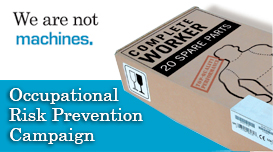Psychosocial Risks
4. Psychosocial Intervention
Methods of analyzing work conditions exist that allow the influence of psychosocial factors to be assessed and which provide information on the measures to adopt to eliminate or at least reduce their harmful effects on the health of workers, thereby contributing to improving the quality of work life in firms. Among the methods for assessing psychosocial factors, the following are worth noting: LEST, Renault, Anact, FSICO del INSHT, Istas21, etc.
Once a diagnosis of the situation has been obtained, the actions needed to eliminate or reduce the detected risks should be planned. Such actions may be grouped into three major blocks: actions to be taken regarding the style of management, regarding the work organisation and regarding the worker.
4.1. Actions regarding the style of management
The firm’s management must be involved in all and every one of the activities related to occupational risk prevention, integrating risk prevention policy and goals with the firm’s general policy and using these to develop risk prevention plans and programmes, which it is to approve and even promote.
As regards the topic we are addressing here, efforts in psychosocial risks should be aimed at achieving good human relations and a good social climate within the firm. To do so, management may act on the systems of communications within the firm and of worker participation, as well as on the style of management.
4.1.1. The system of communications in the firm
In the labour world, besides being a human necessity, communication is an essential tool that all the members of the firm can employ in their tasks . The development of an efficient communications system enables information to reach all personnel upwards, downwards and horizontally via existing organisational channels (both formal and informal).
In matters of occupational risk prevention, deficient communications can give rise to numerous problems, ranging from dissatisfaction due to poor relations with superiors or workmates to accidents at work.
Spoken or interpersonal communication (meetings, working groups, company visits, training activities, interviews, talks, etc.) is important because it influences the climate of the organisation, fostering the participation of workers and feedback.
Written communication (minutes of meetings, reports, newsletters, the company magazine, opinion surveys, suggestion boxes, etc.) avoids the risk of distortion and leaves recipients a hard copy that allows them to remember the message, providing the message is well conceived.
It does however present the drawback of higher costs as well as requiring time in its drafting so that the message is not subject to different interpretations.
4.1.2. El estilo de mando
Depending on the source of the problem, action may be taken with respect to the different roles of management:
- Roles relating to interpersonal relations: managers must have training in group dynamics techniques and social skills training which will enable them to effectively develop their relational roles with respect to other departments or groups within the company itself or external to the firm, their roles as representatives of their working group and their leadership roles.
- Roles relating to the transmission of information: training in communication techniques is very convenient for the important role of transmitting information to workers (goals sought, work orders, changes that are going to take place, etc.) and to superiors (workers’ concerns, opinions and needs).
- Roles relating to decision-making: senior and middle managers who delegate decision-making in certain fields to their subordinates favour the involvement of workers, thereby boosting job satisfaction among the latter.




